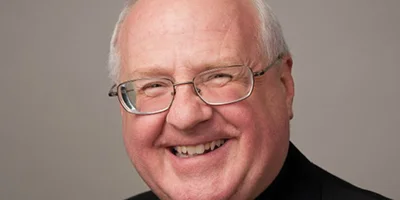
Father Mark Goldasich is the pastor of Sacred Heart parish in Tonganoxie. he has been editor of the Leaven since 1989.
by Father Mark Goldasich
“Live long and prosper.”
For anyone familiar with the old TV show “Star Trek,” those words need no explanation. For those unfamiliar, they’re the greeting used by the Vulcan Mr. Spock. The words were accompanied by a special hand gesture: the thumb of the right hand was extended to the side and the other four fingers formed what looked like the letter “V” (pointer and middle finger as one side; ring finger and pinky as the other). I thought that it symbolized the first letter in “Vulcan.”
The death on Feb. 27 of Leonard Nimoy, who played Spock on the series, corrected my misconception. The story behind the famous Vulcan greeting is much more significant.
Nimoy was born into an Orthodox Jewish family. Once when he was a small boy, he recalled going to temple with his grandfather, father and brother. At the prayer that day, five or six men walked onto a stage-like structure. Immediately, there was a stir in the congregation. His father told the young Nimoy to cover his eyes. The boy looked around to see that people had indeed covered their eyes, some had turned their backs to the stage and others imitated the men on the stage by throwing their tallitot, or prayer shawls, over their heads.
With his eyes now covered, Nimoy heard the men on stage seem to almost shout discordantly. The more he listened, the eerier it became. Finally, Nimoy couldstanditnomore… so he peeked and saw the shouting men with their heads covered and their hands extended over the people. Their hands were in the shape of what people would later think was the Vulcan greeting. In actuality, the men’s hands were in the shape of the Hebrew letter “shin,” and they were pronouncing a blessing over the people.
Shin is the first letter in some powerful Hebrew words: “shalom” (peace); “Shaddai” (a name for God that means “all-sufficient” or “the one who nourishes”); and “shekinah,” which means the “presence of God.” Everyone in the temple had their faces covered or averted because the men on stage were calling down the shekinah or presence of God. Being sinners, no one could stand to see God face to face, so to speak, because it would be too overwhelming and might even lead to death.
So years later, “Star Trek” was working on an episode where Spock goes to his home planet of Vulcan for the first time in order to get married. Nimoy told the director that he thought Spock should have some greeting that Vulcans would use when they saw one another. After all, folks on Earth greet one another with a handshake, a salute or a nod. That’s when Nimoy remembered those men from his youth and their hand gesture of shin while blessing the congregation. Nimoy suggested Spock use that gesture and, as they say, the rest is history.
Nimoy was amazed at how the gesture took off. Within weeks, fans everywhere were using it. Even 50 years later, Nimoy said, people would see him and flash the Vulcan greeting. With a laugh, Nimoy noted that people thought the gesture was akin to a secret handshake. “What they didn’t realize,” he said, “is that they’re blessing each other!”
This past weekend’s Scripture readings called to mind that letter shin. Abraham, in the first reading, would have known God by the name of Shaddai. More significantly, though, was the Gospel, where we heard about Jesus being transfig- ured on the mountain. The cloud that covered Jesus, Moses and Elijah was how the shekinah was often represented in the Scriptures. This “presence of God” was confirmed in the voice that came from the cloud, “This is my beloved Son. Listen to him.”
As we approach the third full week of Lent, keep the letter shin in mind. Remember the God who nourishes us (Shaddai) through his grace and calls us to be his presence (shekinah) in the world, throughout Lent and always, by being people of peace (shalom).
Now that’s how to live long and prosper.


